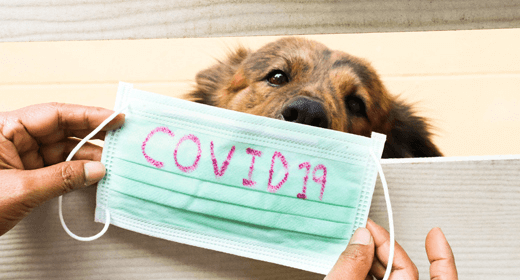

In these unprecedented times we are all concerned about each and every member of the family, including the four-legged ones. Our friends and expert partners at the Waltham Petcare Science Institute have been working tirelessly for more than 50 years to bring their scientific knowledge to benefit pets all around the world. Together, we are closely monitoring the latest events and scientific insights surrounding coronavirus. Please follow this
Opens a new windowlink to Waltham’s latest guidance on how to care for your pet during Covid-19.


Your pooch’s diet defines its overall health and well-being. What it eats contributes to the amount of energy it has throughout the day. As a caregiver, it becomes your responsibility to provide the correct amount of nutrition and nourishment to your fur baby. Understanding the various components of your pet’s diet helps in providing them with the right nourishment.
Although everyone knows dogs need protein, carbohydrates, fat, vitamins, and minerals; did you know your canine friend also requires fibre in their diet? Even though fibre is not completely digestible it is an essential part of your pooch’s diet. High-fibre dog food aids in better digestion and bowel movement. Soluble fibre for dogs helps them in absorbing water. This type of fibre then gets fermented in their intestines to release fatty acids for better gut health. Other than soluble fibre, dogs also require insoluble fibre for better water absorption and digestion.
Fibre in dog food helps the dogs digest their food better. Proper digestion equates to better bowel movement and good gut and gastrointestinal health. Your canine friend’s food should contain at least 2-4% fibre to assist their gut health’s growth and development. Besides, fibre for dogs acts as an absorbing substance that collects excess water and acids. Given below are a few other benefits of fibre for dogs.
Apart from absorbing extra water and acid, the insoluble fibre also helps in cleaning your pet’s gut tract. This makes their bowel movement better. Consuming the right amount of fibre also helps maintain your dog’s anal gland issues. Smaller breeds of dogs are more likely to suffer from these issues. The fibre in dog food makes it easier for stool to pass smoothly without any added effort. Hence, reducing the chances of your pet developing gastrointestinal and anal gland illnesses.
Many breeds of dogs are meant for outdoor life; the lack of proper activity may lead to obesity in such breeds. Pet caregivers often worry about their fur baby being overweight because of the countless hours spent indoors with little to no activity. In such cases, high-fibre dog food is suggested alongside regular walks and playtime to manage the pooch’s weight. The fibre allows your fur baby to digest more food and aid in controlling its calorie intake.
Some types of fibre are slow to digest. This helps in maintaining blood sugar levels in dogs. Slow digestion of fibre stops sudden rise in blood sugar levels. Dogs that consume high-fibre dog food often have lower blood-sugar fluctuations and hence have lesser chances of suffering from diabetes.
At IAMS™, we understand the importance of fibre in a dog’s diet. Hence, our range of dog food not only has proteins, vitamins, and minerals but also fibre. With beet pulp being a consistent ingredient in our dog foods, we make sure that your pooch has a hale and hearty gut. This fibre-rich ingredient provides bulk to move waste. Moreover, it ensures that your dog absorbs all the nutrients present in its meal.
On average dogs need only 2-4% fibre in their daily diet. Anything beyond this measure can be considered excessive fibre consumption for dogs. While fibre is needed for better gut and gastrointestinal health, too much fibre for dogs can be a topic of concern. Given below are a few issues that may occur because of excessive fibre consumption.
Fibre is not completely digestible. Hence, even though limited consumption of fibre helps in eliminating gut-related problems, too much fibre can lead to gastrointestinal problems and increase gas and acidity issues.
While soluble fibre manages water content in the body, insoluble fibre can lead to digestive issues when consumed in excess. Frequent urge to pass stool and diarrhea are some known side effects of consuming too much fibre.
Even if is fibre bad for dogs is a common query, the conclusion is fibre is needed for better digestion and gut health of your pooch. However, excess fibre consumption can lead to certain stomach and gut-related issues, while eating little to no fibre is also not a good choice. Avoiding fibre altogether can lead to the anal gland diseases and gut illness. Hence, as a pet parent, you must ensure your canine friend is provided with the right amount of fibre in their daily diet. Besides fibre dogs also need adequate amounts of protein, carbohydrates, and fat in their diet for consistent growth and development.